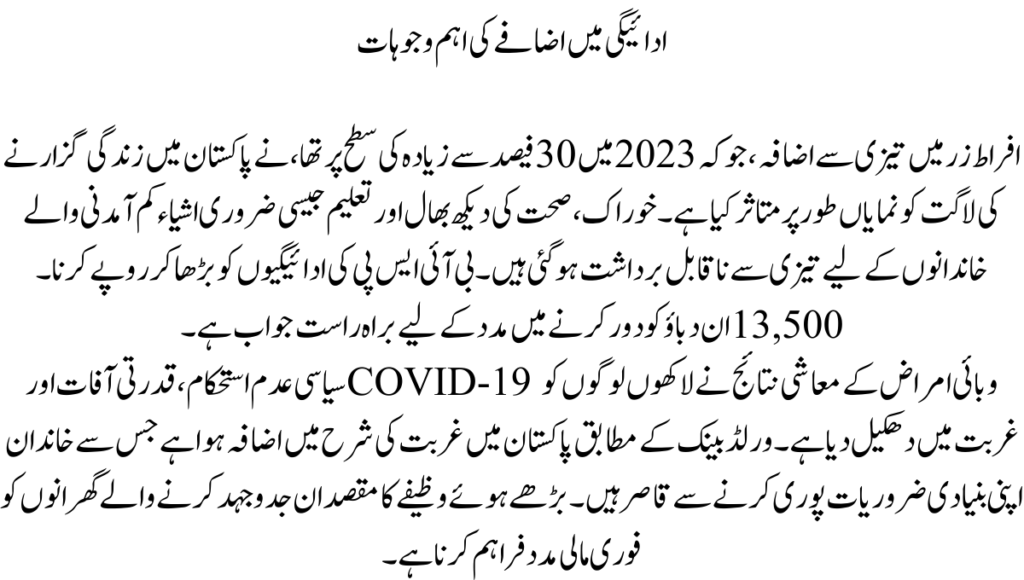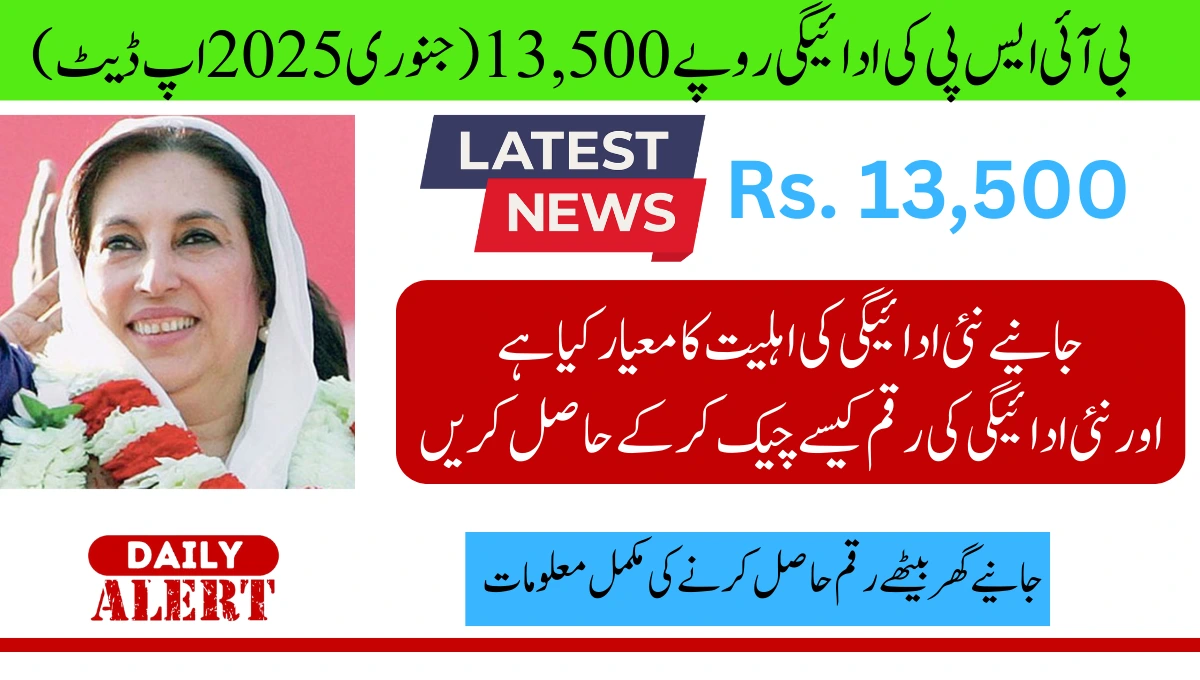The Benazir Income Support Programme (BISP) has announced a significant increase in its quarterly payments for beneficiaries under the Benazir Kafalat Programme, effective from January 2025. This adjustment raises the stipend from Rs. 10,500 to Rs. 13,500, aiming to provide much-needed relief to millions of Pakistan’s most vulnerable families amid challenging economic conditions. Below, we’ll cover all the key details and socio-economic impact of this decision.
The Benazir Income Support Programme (BISP), established in 2008, is Pakistan’s flagship social welfare initiative targeting low-income households. Its primary goal is to alleviate poverty through quarterly cash transfers, particularly to empower women, who often face systemic inequalities. Over 7 million families are currently registered under the program, making it one of the largest and most impactful social safety nets in the country.
Since its inception, BISP payments have been revised multiple times to address inflation and rising economic challenges. This latest increase to Rs. 13,500 marks another step toward improving the welfare of Pakistan’s poorest families.

Key Reasons for the Quarterly Payment Increase
Rising Inflation
The sharp rise in inflation, which peaked at over 30% in 2023, has significantly impacted the cost of living in Pakistan. Essential goods like food, healthcare, and education have become increasingly unaffordable for low-income families. Raising the BISP payments to Rs. 13,500 is a direct response to help offset these pressures.
Increased Poverty Levels
The economic fallout from political instability, natural disasters, and the COVID-19 pandemic has pushed millions into poverty. According to the World Bank, Pakistan’s poverty rate has surged, leaving families unable to meet their basic needs. The raised stipend aims to provide immediate financial support to these struggling households.
Commitment to Social Welfare
Under the leadership of Prime Minister Shehbaz Sharif, the government has prioritized social welfare initiatives to reduce income inequality and promote inclusive growth. Increasing the BISP payments reflects this ongoing commitment.
Population Growth and Demand for Aid
With Pakistan’s rapidly growing population, the demand for financial assistance is higher than ever. Raising payments ensures that the program continues to address the needs of an expanding beneficiary base.
Pre-Election Political Strategy
The upcoming 2025 General Elections may have influenced the timing of this increase, as welfare programs often play a critical role in garnering voter support. This move strengthens the government’s position among low-income communities.
Also read: Empowering Students Honhaar Scholarship Program 2025 Distributes Payment Cheques
Mechanism of the Payment Increase
Eligibility Criteria
- Families must have a poverty score below 34%.
- Applicants should not own land, businesses, or vehicles.
- Recipients must not have traveled abroad.
- Women are the primary beneficiaries to promote gender empowerment.
Payment Schedule
- Quarterly payments will now total Rs. 13,500, disbursed in three installments:
- Rs. 4,500 at the beginning of the quarter.
- Two smaller payments distributed later.
- Payments are made via mobile banking, ATM cards, or designated cash distribution points.
Digitalization and Transparency
To ensure transparency, the government is expanding digital payment systems. Recipients can now access funds through bank accounts or digital wallets, reducing corruption risks and ensuring efficient fund disbursement.
Also read: Check Your Application Status in Punjab Solar Energy Program 2025
Socio-Economic Impact of the Raised Payment
Improved Living Standards
The increased funds will help beneficiaries purchase essentials such as food, pay school fees, and access healthcare services. Although the stipend may not fully eradicate poverty, it provides much-needed relief for families.
Boost to Local Economies
As recipients spend their stipends on basic goods and services, this influx of cash is expected to stimulate local markets, benefiting small businesses and boosting economic activity.
Better Access to Education and Healthcare
The raised payments are likely to enable families to:
- Keep children in school by covering fees and related expenses.
- Afford basic healthcare services, including doctor visits and medications.
Social Stability
By supporting the country’s most vulnerable groups, the program helps reduce social inequalities, promoting cohesion and mitigating the risk of unrest.
Also read: 8171 Update! BISP’s Decisive Actions for Fairness & Accountability
Potential Challenges and Criticisms
While the payment increase is a positive step, it is not without challenges:
1. Sustainability Concerns
Pakistan faces significant debt and budgetary constraints. Critics question whether the government can sustain this payment increase in the long term, especially if inflation continues to rise.
2. Inflationary Risks
Injecting more money into circulation without a corresponding increase in goods or services may lead to further inflation, potentially diminishing the effectiveness of the stipend.
3. Administrative Inefficiencies
Despite digitalization efforts, corruption or inefficiencies at the local level could prevent funds from reaching all eligible recipients. Strong oversight mechanisms are essential.
4. Risk of Dependency
Unconditional cash transfers may inadvertently discourage beneficiaries from seeking sustainable income sources. To address this, the government could integrate skill development and job creation programs alongside cash assistance.
Also read: Benazir Nashonuma Program: New Year’s Installment and Fresh Payments Update
FAQs
What is the BISP?
The Benazir Income Support Programme (BISP) is a government initiative providing cash assistance to low-income families, primarily targeting women in rural areas to reduce poverty and promote economic inclusion.
Why was the payment increased to Rs. 13,500?
The payment was raised to address rising inflation, increased poverty, and the growing financial needs of Pakistan’s most vulnerable families.
Who is eligible for BISP?
Eligibility criteria include a poverty score below 34%, no ownership of land, business, or vehicles, and no history of foreign travel. Women are prioritized as beneficiaries.
How will the payment be distributed?
Payments will be made quarterly, totaling Rs. 13,500, through mobile banking, ATMs, or cash distribution points.
What challenges does the BISP face?
Key challenges include ensuring sustainable funding, avoiding inflationary effects, addressing administrative inefficiencies, and preventing dependency on government aid.
Also read: Exciting News for BISP Beneficiaries in 2025 – Enhanced Support Announced!
Conclusion
The increase in BISP quarterly payments to Rs. 13,500 is a crucial step toward alleviating poverty and supporting millions of vulnerable families in Pakistan. This adjustment demonstrates the government’s commitment to addressing inflation, rising poverty levels, and the growing financial needs of low-income households.
While this initiative is expected to bring significant socio-economic benefits, such as improved living standards and local economic growth, its long-term success depends on sustainable funding, robust oversight mechanisms, and complementary programs that promote self-reliance. The BISP continues to be a lifeline for many, and this payment increase further cements its role as a vital social safety net in Pakistan’s economic landscape.
Also read: CM Punjab Himmat Card Registration Process & Eligibility Criteria











